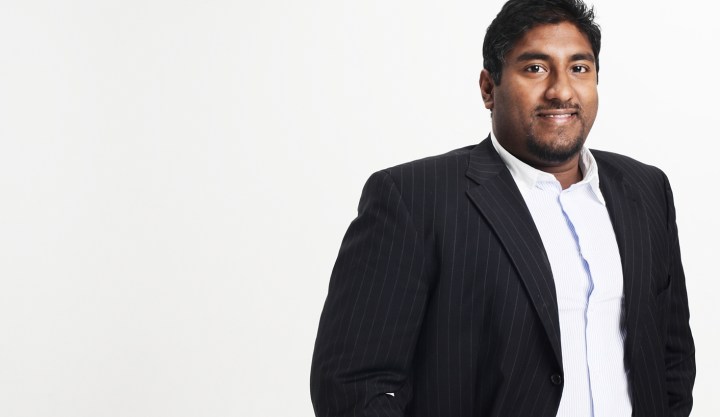Business Maverick
Vinny Lingham: SA’s start-up king and Gyft-ed man

South African tech entrepreneur Vinny Lingham is about to launch his new venture, Gyft, from his base in Palo Alto, California. REBECCA DAVIS talked to him about life as a start-up guru, how SA government policies are harming investment, and why he’s putting his money where his mouth is when it comes to turning Cape Town into a technology hub.
Vinny Lingham, at age 33, “has forgotten more about acquiring traffic than a lot of people in Silicon Valley know”, to quote a TechCrunch article in 2010. He made his name in search marketing, establishing Clicks2Customers and its holding company, incuBeta, aged 24. Then he founded Yola, a business offering free website building and hosting, which today has seven million users. Then he moved from Cape Town to Silicon Valley. Seven months ago he stepped down as the CEO of Yola to focus on his next big thing: Gyft.
That’s more action – and success – packed into a decade than many people manage in a lifetime. So perhaps it’s not altogether surprising to find that Lingham does not lack confidence in an interview situation, albeit one carried out down a crackly Skype line.
With three companies behind him and another on the way, Lingham is living the start-up dream. But he’s quick to state that his lifestyle is nothing like the dotcom tycoon of popular stereotype. “Not all entrepreneurs drive around in big cars with fancy houses. I live in a modest little apartment. It’s nice, but it’s just two bedrooms,” he says.
“The difference between entrepreneurs and other people is that you work for a lot lower salary on a monthly basis, but then you’re building long-term equity wealth and value in your shares and the companies you build. Ambition often comes with sacrifice.”
He’s been living in the US for just over four years now. On his first visit to Silicon Valley, in 2002, it wasn’t a very appealing place to be – the market was dead, and not much exciting was happening. But after Google’s acquisition of YouTube in 2006, energy returned to the valley. At the time, Lingham was spending five months of the year on a plane between the US and South Africa, juggling Clicks2Customers’ substantial American client base.
“I built (Clicks2Customers) up within three and a half years to a $10 million-a-year business, with only one South African client. So all the revenue was coming from the States.”
Clients ranged from eBay to Expedia, and Lingham attributes the search marketing company’s success to his own technical know-how. “I understood the techniques to rank keywords for clients higher than anyone else,” he says simply.
“Other people try and start businesses with a very shallow knowledge of the field that they’re in, and it’s difficult to teach someone else if you don’t know how to do it yourself. So I spent many years building up my knowledge and developed a unique insight into how Google’s algorithms work, and we were able to use that to our advantage.”
But the constant travel to ensure that American clients were happy wore him down, and saw the chain set in motion whereby he left the company in order to start Yola in 2007, and made the move to Silicon Valley shortly afterwards.
Four years down the line, there’s still not a trace of American in Lingham’s accent. He says he doesn’t consider himself at all American. “I’m a South African citizen, and I love South Africa, although I’m disappointed in the way things are going. My mother-in-law was attacked last week in her house in Cape Town. These stories are becoming far too common, and it’s quite disheartening. But I’d love to go back one day, although right now it’s a career choice.”
Lingham maintains strong South African ties: he still has fingers in a lot of business pies, and he actively invests in and mentors entrepreneurial talent in the country. He was also a co-founder of the Silicon Cape Initiative, which aims to turn the Western Cape into a tech hub. He thinks the province is the perfect place for this.
“There’s a similar vibe to Silicon Valley, some fantastic tech companies, and the culture is nice and diverse – people from all around the world live there,” he says. “It’s not just about Cape Town, it’s about South Africa, but you’ve got to start somewhere, and tech hubs needs to be geographically centralised, and Cape Town makes a lot of sense.”
His frustration at what he sees as the South African government’s obstructionism in making it difficult for expatriates to make a meaningful economic contribution from overseas is a theme he returns to continually. He cites the notorious “loop structure”, which refers to the prohibition on South African residents holding any South African assets indirectly through a non-resident entity. (Moneyweb once suggested that the loop structure “has probably scuppered more cross-border transactions contemplated by South African residents than any other exchange control or tax policy”.)
Lingham describes the loop structure as a “stupid rule from apartheid. I want to hire South African employees, and I want to give them stock options, in order to build up a culture, to build the business. I’m not allowed to do it.” He sees this as exemplifying the government’s blinkeredness when it comes to making the country an attractive prospect for investors.
“The biggest mistake that the government and people of South Africa (are) making is to think that South Africa is going to be the biggest economy in Africa in 10 to 15 years,” he warns. “South Africa is no longer the gateway to Africa – that’s just BS. If you want to invest in Africa, you actually avoid South Africa because of bureaucracy and red tape. The governments of Tanzania and Kenya, Nigeria, make it very easy for foreigners to invest. South Africa’s just sitting back on its laurels, and by the time the government realises (that), it’ll be too late.”
For entrepreneurs within the country, Lingham also thinks there are substantial structural and cultural difficulties impeding the establishment of a vibrant venture- capital scene. Among them, he cites the often antagonistic relationship between business founders and funders; the lack of potential exits for backers because there’s not much of a culture of mergers and acquisitions; the lack of consumer protection in South Africa; and the fact that there hasn’t yet been the kind of technology revolution necessary for start-ups to take on big incumbents.
When I read Lingham’s list of concerns to local tech guru Dave Duarte, his response is instantaneous: “That’s 100% correct. There is no doubt that entrepreneurship needs a boost in this country. IP-based businesses are simply not seen as where public growth comes from – it’s all about small-scale retail, mining, sectors like that.”
Lingham thinks, if anything, the government needs to get less, rather than more, involved in fostering entrepreneurship. “The goal of government should be to eliminate red tape for entrepreneurs, not create it,” he says. “Government should set the playing field and be the referee in the soccer match, not the player. Unfortunately, the government wants to be the referee, the player and the ball.”
It’s understandable that Lingham comes across as passionate on the topic, because entrepreneurship has been his game since the age of seven, when he started flogging Thundercats stickers to his classmates during break. He continued to sell whatever he could get his hands on during high school, and upon matriculating he enrolled in a degree in Information Systems at UCT, which a lack of funding did not permit him to complete. He’s not terribly regretful about that point.
“Too much education in business is a bad thing, because the time you’re spending learning theory you could be gaining real-world experience,” he says. “I laugh at people who, from studying business, go into an MBA after one year’s experience. You learn nothing like that. MBAs don’t maketh the entrepreneur.”
When asked what he thinks it is that makes Vinny Lingham a successful entrepreneur, he hums and haws, citing perseverance and downplaying the role of natural ability. Duarte offers one answer: “This guy is super smart, really brilliant,” he says. “From the early days in the tech community, Vinny has always been stand-out figure. Like many of us I went to him for guidance, advice and inspiration. He’s always been very vocal.”
It’s this “vocal” aspect, however, that may have contributed to getting others’ backs up a little. That, and a certain amount of professional jealousy. “Vinny has been very much in the public eye and been very open about his successes,” says Duarte. “There’s a tendency in this country that when someone shines a little too brightly, he has to be brought down to size.”
There will be a lot of curious South African eyes on Lingham’s latest venture, and it sounds like not all will be wishing him well. But that’s not likely to faze him too much: he’s extremely optimistic about the prospects for Gyft, which launches next month. “What’s the next big thing? It’s definitely mobile payments,” Lingham says.
“I analysed where the opportunity was there, and credit cards are a very difficult market. But when you look at gift cards, it’s a lot easier as a market. It’s a lot less regulated, and it’s huge – in the US alone it’s $100 billion a year.”
Lingham hit on the idea of creating a mobile wallet in which people could store gift cards, received as presents for birthdays, weddings and so on. “People give gift cards like crazy here. The thing is that people get them, but you put them in a drawer somewhere and you forget about it, you don’t know where it is, it’s not with you all the time. We’re basically using your smartphone as a way of keeping your gift cards with you, and when you go past a store it reminds you, it tracks your expiration dates, it allows you to push it to a friend if you don’t want it anymore, and we’ll also sell gift cards through the app – with a credit card you can buy from us in seconds. So it’s a very cool application.”
Gyft, then, will be a mobile platform for gift cards. It will launch in the US, but will eventually go global. Lingham thinks it’s going to be big. “Gyft is going into a $100 billion market,” he repeats. “So even if we’re just mildly successful…” DM
Read more:
- Building Silicon Cape: How Much of a Difference Can One Guy Make?, on TechCrunch
- Vinny Lingham leaves Yola, starts Gyft, on BusinessTech


















 Become an Insider
Become an Insider